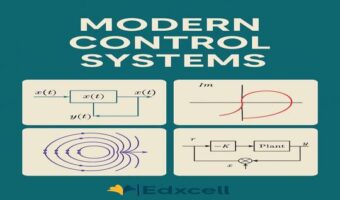Modern Control Systems (MCT)/ Advanced Control Systems (ACS)
About This Course
This course offers an in-depth understanding of modern control theory, focusing on state space modeling and analysis of dynamic systems. Students will learn how to represent systems in state space, analyze their controllability and observability, and assess the behavior and stability of nonlinear systems using advanced techniques such as Lyapunov’s method. The course also introduces the principles of optimal control, guiding students through the use of calculus of variations to determine optimal solutions. Additionally, it covers adaptive control strategies, including the design and implementation of Model Reference Adaptive Systems (MRAS).
The course is taught by a well-experienced and reputed professor, ensuring students receive expert guidance and practical insights into modern control system design and analysis.
By the end of this course, students will be proficient in modeling control systems, analyzing nonlinear system stability, solving optimal control problems, and designing adaptive controllers for dynamic systems.
Course Objectives:
The primary objectives of this course are to:
- Provide the fundamental knowledge required to model control systems using state-space representation and to analyze their controllability and observability.
- Educate students on the behavior of non-linear systems and the various methods used to determine their stability.
- Develop a deep understanding of Lyapunov stability analysis for non-linear systems.
- Familiarize students with the principles of optimal control and teach them how to determine the optimum of a functional using calculus of variations.
- Introduce the concept of adaptive control and demonstrate the design of Model Reference Adaptive Systems (MRAS).
Course Outcomes:
After successful completion of this course, students will be able to:
- Model control systems using state-space techniques.
- Analyze the behavior of non-linear systems and apply suitable methods to assess their stability.
- Apply Lyapunov’s method to evaluate the stability of non-linear systems.
- Formulate and solve optimal control problems using calculus of variations.
- Understand and design adaptive control systems, including MRAS.
References:
- I.J. Nagrath and M. Gopal, Control Systems Engineering, 5th Edition, New Age International Publishers, 1984.
- Katsuhiko Ogata, Modern Control Engineering, Prentice Hall, 1997.
- Donald E. Kirk, Optimal Control Theory: An Introduction, Dover Publications.
- Karl J. Åström and Björn Wittenmark, Adaptive Control, 2nd Edition, Pearson Education.
- M. Gopal, Modern Control System Theory, New Age International Publishers.
- Gene F. Franklin, J. Da Powell, and Michael Workman, Feedback Control of Dynamic Systems, Pearson Education.
- Chi-Tsong Chen, Linear System Theory and Design, Oxford University Press.
- Hassan K. Khalil, Nonlinear Systems, 3rd Edition, Prentice Hall.
- Brian D.O. Anderson and John B. Moore, Optimal Control: Linear Quadratic Methods, Dover Publications.
- Petros A. Ioannou and Baris Fidan, Adaptive Control Tutorial, SIAM (Society for Industrial and Applied Mathematics).






